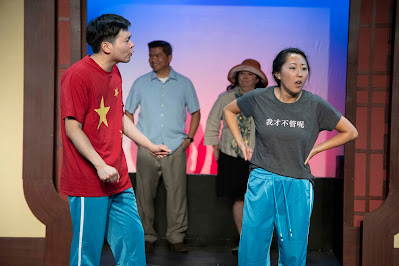FTC's 'Tiger Style!' asks: Racial stereotypes, where are you from, where are you going?
In Mike Lew's "Tiger Style!," the pressures upon a model minority may lead it to become a mad (crazy as well as angry) model minority. From that madness and that anger can emerge the sort of frantic attempts to achieve fulfillment that pervade the play.
The trenchant farce, brimming with social commentary and with a note of restful affirmation at the end, opened a three-weekend run Friday night at Fonseca Theatre Company. To go full Western or full Eastern are opposing missions the show's brace of heroes adopts. Neither attempt to escape their respective identities as they've been cultivated since birth is destined to be successful.
Jordan Flores Schwartz, the FTC's producing director, directs an expressive five-person cast, three of
 |
| Albert and Jennifer at sixes and sevens, with their parents in perpetual background. |
whom play several roles each. The set's back wall features a prominent pen-and-ink drawing of the title's tiger, which also resonates with the meaning of the groundbreaking Chinese hit film "Crouching Tiger, Hidden Dragon." And the significance of that title suggests the passion under the surface of everyday life; figuratively, scary creatures always seem to generate emotional energy all of us may have trouble dealing with.
The verbal fireworks here are concentrated in a Chinese-American brother and sister, California overachievers in their disturbed young adulthood. The writing may be a bit overloaded, but it is richly imagined and wickedly funny. The siblings find the values and skills they've absorbed from childhood inadequate. Kim Egan and Sean Qiu play Jennifer and Albert Chen, irked in Irvine and evidently at odds with meeting the challenges of personal fulfillment anywhere in the contemporary West. Some of those challenges are rooted in racism, as well as in stereotypes somewhat subscribed to by status-conscious Chinese-Americans, such as their parents.
Lew has made durable survivors of those parents, played by Ian Cruz and Tracy Herring, who were compatibly partnered also in FTC's "Salt Pepper Ketchup" in early 2020. Their comic gifts are drawn upon more deeply in this show; they are also the characters who best convey the irony of their offspring's need to identify as unlucky, oppressed outsiders shocked to discover they may be onlookers on their own lives — despite all the awards, educational credentials and their almost offhand achievement of success in classical music, now discarded.
The parents seem innocent of any agenda that could be hemming the kids in, but they may be a touch disingenuous about it. Parents have a way of deflecting the energy in their children's confrontation scenes; this mom and dad share with many parents from all races and places the techniques they honed long ago during toddler tantrums.
Cruz also plays Albert's sell-out boss Melvin, with whom he shares an ethnic background but is otherwise smoothly assimilated. I wish Melvin's wig didn't look so silly, because it made him look more patently ridiculous than his behavior was supposed to. I think the playwright is weighing some insights about status discrepancies within the Chinese-American community that are in danger of getting lost every time Melvin is onstage just because of his appearance.
Of Herring's other roles, the one that struck the most sparks, especially in opposition to Kim Egan's Jennifer, was as a therapist hard put to connect with this over-studious and controlling client. The modulation from spouting platitudes through trying to meet Jennifer on rational common ground to finally letting her exasperation show was delightful. It also amounted to one of the more involving episodes of Egan's performance on opening night.
The fifth actor, Jacob Pettyjohn, filled the inevitable function of representing white supremacy, though both his characters were such enjoyable caricatures that it became clear Jennifer and Albert are partly responsible for their relatively inferior position with respect to each one. The characters of Albert's colleague, then superior, Russ the Bus and Jennifer's feckless, commitment-averse boyfriend Reggie exerted a kind of control compounded of white-skin privilege and the siblings' unintended complicity.
The plot moves onto a fantasy level that gives body to Albert's dreams of significance, which are just so many castles in the air. There's a climactic visit to the People's Republic of China. That country predictably doesn't offer the sort of homeland experience Jennifer and Albert were expecting. The array of threats and challenges occupies a whole new battlefield far from the feeling of dislocation the young Chens already had in America. It's not worth a spoiler alert to mention that (surprise!) it turns out there's no place like home. The sentimental ending seems both acceptable and unavoidable. The turmoil leading up to it is both sufficiently entertaining and thought-provoking. "Tiger Style!" is never short on style as it drives the message home.



I also saw the play on opening night and enjoyed it, but as usually happens, after I read Jay Harvey’s review, I now better understand the play and what it’s communicating. Thank you!
ReplyDelete